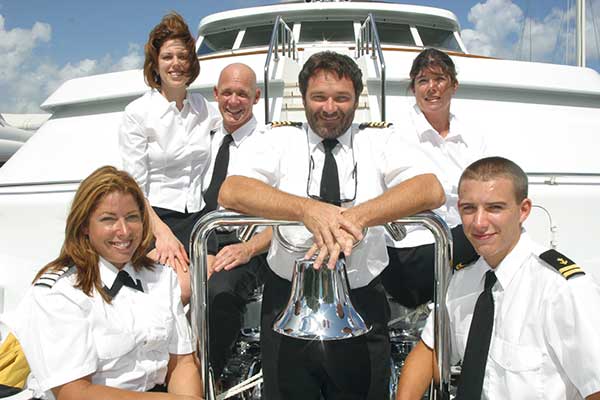
Yacht Crew Agency / Candidates / Yacht Salaries Guide

Yacht Salaries Guide
Many of our candidates are asking us for advice on what their salary should be on a yacht.
We have prepared a table of approximate wages in the yachting industry. Even though these salaries may give you a reference point, we would like to inform you that all yachts are different, equally as their owners.
These salary rates are based on the current state of the employment market in yachting in 2024. Real wages always vary depending on the candidate’s experience, training, certificates and additional skills.

Different Salaries of Yacht Crew Jobs
People working on a yacht can earn extras.
Tips are another big financial reward for the team of the superyacht to be rewarded. Specially operating on a charter yacht gives crew a great chance to earn extra money, but how much is expected? It is up to it. Common tips vary from 5% to 20% of the charter cost, sharing about 10% and split by all crewmembers.
Living on a private yacht cannot provide all such advice, but it has its own crew benefits, including greater rest, longer vacations, rewards and also the prospect of the owner’s unexpected donations. Such proprietors are often considered to tip.
Different Position in a Yacht Crew, Different Salary
Without a doubt, each position has a different monthly income. So the higher position you will get the higher salary you will get. Here are an overview about some positions on a yacht.
The Captain must be skilled and trained in maritime affairs, outstanding navigational knowledge, exceptional administration, coordination, strategy and diplomacy. A Superyacht Captain will have outstanding nautical expertise, repairs, electronics, professional procedures and accounting, Finance and administrative records knowledge. A captain must have a cool, charismatic demeanor and must be exceptionally competent to work with men, staff and visitors. Average monthly salary : 60ft (18m) à 2,200€ – 3,700€
During the captain’s absence, the Chief Officer / First Mate will have the captain’s good management and interpersonal abilities and outstanding experience and procedures in ISM and ISPS. The CEO will be someone with a solid history in deck work from prior practice with Deckhand or Boson. Average monthly salary : 60ft < 75ft (23m) à 2,200€ – 3,000€
Under the command and control of the commander, the chief steward must perform his or her duties. The head chef may therefore train and prescribe some lower level stews under his command, as the sole responsible for the interior of the vessel and for offering a satisfactory hospitality service to fulfill the holidaymakers ‘needs. Excellent support, networking and management are a must, as is an innovative environment. Average monthly salary : 100ft (33m) – 140ft (43m) à 2,200€ – 3,000€ +
Morgan & Mallet Yacht Crew Agency helps all yachting professionals find the best job and create a career in yachting
By clicking “Accept All Cookies”, you agree to the storing of cookies on your device to enhance site navigation, analyze site usage, and assist in our marketing efforts.
Hire and Find Experienced Yacht Crew staff
This form is for employers who are looking to hire crew only.
You want to talk to a recruiter to help you personalise your recruitment. Choose a date from the list of available appointments and let us guide you.
Click one of our contacts below to chat on WhatsApp

Social Chat is free, download and try it now here!
Insert/edit link
Enter the destination URL
Or link to existing content

Yacht Crew Salaries: Complete Guide to What Yacht Crew Earn
It’s no secret that the impressive yacht crew salaries attract most people into the exclusive yachting world.
Junior deckhands or stewardesses can earn starting salaries of $3000 per month. With a few years of experience and some courses to back you up, this amount moves up towards $4000-$4500 per month!
In order to compile this superyacht crew salary guideline, I have taken 10 of the top yachting platforms and used all of their data, combined with my personal experience, to reach an average salary expectation for each position.
Table of Contents
How Much do you Make Working on a Yacht?

Yacht Captain Salary
- 20m-30m: $4000-$7500
- 30m-40m: $5500-$9500
- 40m-50m: $8000-$15000
- 50m-70m: $13000-$19000
- 70m+: $16500+
Requirements of a Yacht Captain
- Years of experience needed: 3-5 years of experience as Chief Officer/Mate and more than 5 years of experience as a Captain for larger yachts
- Minimum level of Qualification: 200ton licence which allows you to drive vessels below 200tons
The Captain has the highest level of responsibility onboard the yacht and hence they earn the most out of all the yacht crew salaries.
Captains are accountable for the overall safety of the yacht, crew members and guests.
They also handle daily operations of the yacht, guests, and owner liaison. They deal with management companies, port control, budgets, human resources, and many more tasks and logistics that make the job demanding and stressful.
On top of this, Captains are required to hold high levels of certifications depending on the size of the yacht they are driving.
Yacht Captain salaries can sky rocket with higher levels of qualifications.
If you are looking to become a Yacht Captain one day I recommend looking into the courses required so you can get started with licenses and sea time. It takes time to get there, but when you do it will be worth it.

Chief Officer Yacht Salary
- 30m-40m: $4000-$6000
- 40m-50m: $4500-$7500
- 50m-70m: $5500-$9000
- 70m+: $8000+
Requirements of a Chief Officer
- Years of experience needed: 3-5 Years
- Minimum level of qualification: Officer of the Watch
The Chief Officer is second in command to the Captain and is responsible for carrying out the Captain’s standing orders.
On smaller yachts, the Chief Officer is referred to as the Mate.
The Chief Officer is responsible for carrying out the safety duties onboard and assisting in the bridge with paperwork and navigational planning.
The Chief Officer is also responsible for leading and managing their deck team, ensuring crew are following their duties as well as managing the water sports and guest activities.
The salary of a Chief Officer depends heavily on the license held.

Bosun Yacht Salary
- Years of experience needed: 2-3 years
- Minimum level of qualification: Yacht Master Offshore
- A yacht Bosun salary can vary between $4000 and $6000.
Responsibilities of a Bosun
The Bosun is essentially the Lead Deckhand onboard. A lead deckhand salary on a larger vessel will be similar to that of a bosun salary on a smaller vessel.
This is an opportunity to step up from being a deckhand and gain some experience in a leadership role. This position is in place for larger yachts so that when the Officer is busy with bridge duties, someone is in charge on deck.

Yacht Deckhand Salary
Years of experience needed: 0
- Minimum level of qualification: None needed, however Power Boat Level 2 and Yacht Master offshore will put you at a great advantage
- Entry-level yacht crew salaries start at $3000 and can go as high as $4000/$4500.
Responsibilities of a Deckhand
A Deckhand is an entry-level role on a yacht.
You need to spend a few years (or less) as a Deckhand in order to learn and gain experience so that you can step up in the ranks and obtain your licenses.
This role will be very hands-on in maintaining the exterior of the yacht. Duties will include cleaning, polishing, varnishing, sanding, caulking, and any other maintenance work required.
Chief Steward / Chief Stewardess Salary
- 30m-40m :$4500-$5500
- 40m-50m :$5000-$7000
- 50m-70m- $5500-$8000
- 70m+: $7500+
Responsibilities of a Chief Stewardess/Steward
- Years of experience needed: 3-5 years
- Minimum level of qualification: Depending on the size of the vessel you may need courses such as Food Hygiene and Safety, Silver Service, WSET, or a Purser course
The Chief Stewardess or Steward is responsible for all the interior operations of the yacht .
They are responsible for managing the interior team, and ensuring the interior of the yacht is maintained to the highest standards. Besides cleaning and laundry schedules , this also includes provisioning for crew and guests, budgeting, accounting, and training of junior crew.

Steward or Stewardess Yacht Salary
- Minimum level of qualification: Depending on the size of the vessel you may need courses such as Food Hygiene and Safety and Silver Service
- Salaries start at $3000 and go up to $6000
Responsibilities of a Steward or Stewardess
A Stewardess/Steward is an entry-level position working within the interior of the yacht.
There are rankings within the interior (2nd, 3rd, 4th Steward/Stewardesses). As you spend more time in the industry, you will be promoted to higher ranks, and with that will come a better salary and more responsibility.
This role covers a range of tasks, including but not limited to housekeeping, laundry, bartending, table scaping, floral arrangements, serving, and hosting guests.

Engineer Yacht Salary
- 20m-30m: $4000-$5000
- 30m-40m: $4500-$6500
- 40m-50m: $6000-$8000
- 50m-70m: $7500-$11000
- 70m+: $9000+
Requirements of an Engineer
- Years of experience needed: 2-4 years in an engineering role onboard as Deck/Engineer or relevant land-based experience
- Minimum level of qualification: AEC
The Engineer onboard is responsible for all mechanical functioning and maintenance of the vessel. This is a very technical role that can pay well as you gain experience and obtain your licensing.
Yacht Chef Salary
- 20m-30m: $4000 – $5000
- 40m-50m: $5500 – $75000
- 50m-70m: $6500-$9500
Requirements of a Yacht Chef
- Years of experience needed: 3-5 years depending on previous experience
- Minimum level of qualification: Food Hygiene and Safety Level 2
The Chef is responsible for feeding the crew 2 to 3 healthy and sustainable meals a day. They are of course required to prepare meals for guests when onboard to the highest of standards.
In their day-to-day tasks, they will be responsible for their own provisioning of the galley, maintaining stocks, cleanliness, and hygiene of the galley.
The salary of the Yacht Chef varies depending on qualifications and experience.

Yacht Crew Salaries for Private vs Charter Yachts
There are two types of super yachts that require crew: Private and Charter yachts. The salaries for yacht crew differ slightly between the two.
Private Yacht
A private boat is owned by a single person or family who uses the yacht for their own purposes. They don’t charter it out and you can expect to have the same guests onboard for the duration of your contract.
The benefit of these programs is that you get to know your guests well so you may find it easier to manage their wants and needs.
You may also benefit from traveling to off-the-beaten-track locations as I have!
For yacht crew working on these private boats, you will usually not receive charter tips.
Charter Yacht
A charter boat is one that gets chartered out by guests. This operates as a business and also means you will have different guests for every trip.
If you work on a charter boat you can expect to receive charter tips at the end of each charter. These are usually 10%-20% of the charter fee!
Considering these tips can be anywhere from $2000-$5000 per week depending on the size of the yacht, charter boats offer great earning potential and can skyrocket your salary as a yachtie.

Hi, my name is Lisa, a Chief Stewardess in the yachting industry with 10 years of experience, as well as 8 years of hospitality experience prior to that. Being in the yachting industry has been a whirlwind of adventure, growth, challenges and some of the best experiences of my life, and I am excited to share my knowledge and experiences with all of you.
How to Write the Perfect Yacht CV [With Template]
A day in the life of a yacht stewardess.

- Career Advice
- Salary Guide
- Digital Dockwalk
2023/2024 Superyacht Crew Salary Guide

Whether you’re continuing a long-standing career, climbing the career ladder, or getting your feet wet for the first time, Dockwalk ’s Salary Guide provides the full picture when it comes to crew compensation.
Salary is generally one of the top motivators for those looking for jobs in yachting, but it remains a closely guarded secret. Each year, the Dockwalk Salary Survey goes out to thousands of crewmembers and crew agencies across the world, gathering real-time salary feedback with the aim of creating greater transparency and understanding across the industry.
The 2024 Salary Survey is now closed. Check out the results in the September 2024 issue.
The Results of the 2023 Salary Survey
Our annual salary survey provided some unprecedented insights to what captains and crew earned in 2023.
The yachting industry is slowly returning to normal in the wake of the pandemic. Yachts are back to work around the world and many new ones are in the pipeline thanks to the surge in popularity the "social distant" yachting lifestyle has enjoyed. But, while this return to normalcy has opened up new crew jobs this year, crew themselves have been returning to the workplace in large numbers and competition has been fierce.
Many of the crew agents reported that crew wages largely are flat this year compared to last. Salaries went up in 2021 and 2022 when crew were in short supply, but now more crew are available than previously. While crew are demanding higher pay this year, they’re not necessarily receiving it, but some agents have seen salaries continue to rise since Covid. There are many factors that can affect the salary crew can expect, including where a yacht is based and the season.
The tables below show the “agency range,” which gives the average lows and highs of all ranges provided by the agencies, the “poll range,” where results from individual working captains and crew are tallied to show the lowest and highest of all the responses, and the “poll average” calculated from all the responses. Note that our figures do not account for longevity and experience, crew benefit packages, tips, or similar extra remuneration.
Not all positions with corresponding boat sizes had enough poll responses to be considered significant; those categories are marked with an asterisk to indicate if fewer than five crew responded in that size range for that position. Several categories had no or only one response, which is also noted.
To view the full table:
Dockwalk Salary Survey 2023 in USD and Euros
Essential Guides
Ocean Mapping
New to Yachting
- Mar 11, 2021
Salary is generally one of the top motivators when choosing a job onboard a yacht, yet it is usually one of the best-kept secrets within the industry.
When negotiating the final salary, it's important that both the employer and employee have an idea of what the standard is for that particular position. This will help keep the transparency and build trust.
To keep their finger on the pulse of the industry and understand the changes that are happening within, YPI CREW set off to launch the yachtingsalaries. com website in 2016. There, every crew member in the industry is welcome to enter their yacht crew salaries along with the position they serve on a yacht. The process is completely anonymous and serves as a way of monitoring the industry's yacht crew salary movements. Yacht crew can also visit the site to check the anonymous data their peers have entered for reference.
The Importance of Yacht Crew Salaries Reports
Informed employers recognise that in order to attract the top level of talent and experience for a particular role, one of the strongest influences they have is the salary they can offer. To stay competitive within the yachting industry you have to offer competitive yacht crew salaries that reflect the current marketplace. And in order to do this, you have to know what the current market rate is.
Equally, employees can use a yacht crew salary report such as this as a guide point to get an idea if a job offer is reflective of the industry and the role they serve.
The Crew Salaries Data and How We Collect It
In 2016, YPI CREW launched a peer-to-peer salary comparison website for the yachting industry. Here, anyone working in the industry is welcome to anonymously enter their yacht crew salary along with their rank.
has so far attracted over 5.655 entries since its launch in 2016, providing an informative yacht crew salary guide for employers and employees. Best of all, the salary data is free for anyone to access.
The figures shown here are median values of the real salaries entered by yacht crew. They can be used as orientational figures but the real salary offered during the recruitment process will vary depending on the candidate's experience, training, certificates, and additional skills. This is why, when looking for work, it's important to have someone guiding you and championing your skills and experience.
All yacht crew salaries are expressed in euros. Please note that the blanks in the graphs are due to either lack of entries for that particular category or the nonexistence of a role in a specific segment. For example, there are generally no third officers on yachts smaller than 50 meters.
To visit the site to contribute your salary or conduct a free search of the salary database, visit
Data presented here is collected from anonymous yacht crew members. It should not be seen as a definite portrayal of the current market but merely an informal indication.
As salary data is entered by members of the community the site works on an honesty system. There is really no incentive for contributors to mislead people about what they earn. Any inflated or inconsistent salary entries can be 'flagged' as suspicious by other members of the community or by YPI CREW and quickly removed from the system to ensure the accuracy of data is maintained.
Yacht Captain Salaries
347 captains have contributed their salaries. Of those, 287 (82%) are working on motor yachts and 60 (18%) on sailing yachts. This is coherent with the ratio of the global world yacht fleet. 83% of which are motor yachts and 17% are sailing yachts. Overall, only 33% of captains who contributed are on rotation. Rotation usually, if and when available, starts on yachts over 50m. When talking about sailing yachts, we didn't receive any entries for sailing yachts above the 51-65m segment. Also, salaries were on average slightly lower on sailing yachts compared to same-sized motor yachts.
Yacht Captains present the most senior management of a yacht, which is obviously reflected in the salary they command. Expectedly, with the size of the yacht increasing, so do salaries.
Experienced recruiters are invaluable at this level as they can definitely add value in the salary negotiation stage; it is their role to act as a middle person to ensure that, when a job offer is made, it is to all parties' satisfaction and is therefore accepted. They not only know how best to champion captains, their skills and experience at interview stage; they help craft and finesse a deal.

2020 Yacht Crew Salaries for Motor Yacht Captains

2020 Yacht Crew Salaries for Sailing Yacht Captains
Deck Crew Salaries
214 Deck Crew have contributed their salaries, broken down as 116 Chief Officers, 16 Second Officers, 12 Third Officers, and 64 Deckhands.
From the data, we see that fewer Chief Officers (43%) reported having a rotational position compared to Second Engineers (57%). However, they reportedly benefit more from rotation than Captains who are at 33%.

2020 Yacht Crew Salaries for First or Chief Officers

2020 Yacht Crew Salaries for Second Officers

2020 Yacht Crew Salaries for Third Officers or Bosuns

2020 Yacht Crew Salaries for Yacht Deckhands
Engineer Salaries
279 technical crew have contributed; 162 Chief Engineers, 60 Second Engineers, 16 Third Engineers, and 25 ETO/AVIT.
Overall, many more Engineers reported being on rotation than Captains. We see that 72% of Chief Engineers, 57% of Second Engineers and 56% of Third Engineers are rotational, along with 88% of ETO/AVIT Engineers.
For Chief Engineers we note that beyond the 66 – 80m segment, there is no data for permanent salaries. This reflects the engineering recruitment market where in fact, from +65m upwards, the market is rotation only, apart from a few exceptions. The same goes for Second Engineers and ETOs where permanent contracts on +65m yachts are for build contracts only. It is our experience that the market is rotation-only for Engineers on operational yachts over 65m.

2020 Yacht Crew Salaries for Chief Engineers

2020 Yacht Crew Salaries for Second Engineers

2020 Yacht Crew Salaries for Third Engineers

2020 Yacht Crew Salaries for ETO, AVI & Electrical Engineers
Chef Salaries
65 yacht Chefs contributed with their salaries, of which 50 were Head Chefs and 15 Sous Chefs.
It is our experience that at the point of recruitment on yachts +50m, most yacht Chef jobs offer some sort of rotation, so it surprising that only 26 % of Chefs who contributed are on rotation.

2020 Yacht Crew Salaries for Yacht Head Chefs

2020 Yacht Crew Salaries for Sous Chefs
Pursers & Stews
34 Pursers, 61 Chief Stews, and 22 Second Stews contributed their salaries.
Pursers, after Engineers, are the category who most have access to rotation. 59% of Pursers reported having rotation whilst only 18% of Chief Stews said they benefit from that perk.
Our experience is that in the past year, perhaps due to Covid-19, salaries offered to Stews were somewhat lower than the year before.
This underlines again the added value of registering and teaming up with recruiters who have their fingers on the pulse and are able to assist in negotiating the best conditions for job offers. Each situation is unique. Likewise, the same recruiters will advise Captains on the state of the crew market and how to position themselves in terms of conditions and salary to attract the best suitable, interested and available candidates

2020 Yacht Crew Salaries for Yacht Pursers

2020 Yacht Crew Salaries for Chief Stews and Stewardesses

2020 Yacht Crew Salaries for Second Stews and Stewardesses

2020 Yacht Crew Salaries for Yacht Stews and Stewardesses
Most read articles

Tips & Tricks
How many crew members are needed on a yacht?

How to Find A Caribbean Yacht Job

Yacht Job Offers
Open Yacht Crew Jobs In April 2024

Industry News
Is a career in the yachting industry a good fit for me?

YACHT CREW GUIDES
IS YACHTING THE RIGHT CHOICE FOR ME?
Essential yacht guides

Mandatory certificates

What you need to know about B1/B2 visa

How to prepare for a yacht interview?
Read more latest news

Olympic Grit and Resilience: What Yacht Crew Can Learn from Elite Athletes

YPI CREW Announces its 2024 Superyacht Recruitment Market Report

Mind the Gaps: How to Explain Employment Breaks on Your Yacht Crew CV

YPI CREW Yacht Crew Salaries Report 2020
INDUSTRY NEWS

HOW TO WRITE A MEMORABLE YACHTING CV

YACHT CREW SALARY GUIDE
Error 404 — page not found, we’re sorry, we couldn’t find what you were looking for.
Please return to the YPI CREW homepage
Let’s get started. Call us on +33 (0)4 92 90 46 10 or email us.
Our mission, vision and values, mlc 2006 compliance, essential guides, yacht crew positions.
Chief Officer
Second Officer
Third Officer
Chief Engineer
Interior Crew
Head of Service
Head of Housekeeping
Specialist Positions
Spa Manager
Spa Therapist
Personal Trainer & Yoga Instructor
Hairdresser
Mandatory Certificates
B1/b2 visa information, how to write a memorable cv, how to prepare for an interview, yachting seasons, yacht crew salary guide, is yachting the right choice for me, cv templates, ocean mapping, new to yachting.
+33 (0)4 92 90 46 10

Yacht Crew Positions and Salaries
The organisational structure onboard a superyacht follows a strong hierarchy based upon a military model. Exact job duties and lines of authority are set and strictly adhered to. This hierarchy is followed on the vast majority of yachts; however, responsibilities of the crew on smaller yachts are often merged.
There are four departments on yachts with clear organisational structure:
- Deck (including Bridge) – Safety, passage delivery, maintenance of the yacht's exterior, guest outdoor activities
- Engineering – Safety and smooth operational running of the yacht
- Interior – Housekeeping, guest wellbeing, activities, accounting
- Galley – Food preparation, stock control, hygiene, galley maintenance
The top of the hierarchy on each yacht is the Captain , who reports to the yacht owner either directly, or through a representative or a yacht management company.
Salaries vary and depend on the yacht size, use, type and location, as well as the experience and qualification of the crew member. We included typical salaries of crew based on the data available from reputable industry sources, as well as our research of over 60,000 crew registered with us.
Deck Positions
The primary duty of the Captain is the overall safe manning and operation of the yacht. Yacht Captain is responsible for the vessel, yacht crew, owner and guests, including personnel management, shipyard/project management, legal and regulatory compliance, accounting, achieving owners' objectives, and answers to the owner regarding all decisions.
| Captain | €4,000 - €15,000 |
First Mate / Chief Officer
The First Mate or Chief Officer is the right hand of the Captain. Takes command of the yacht from Captain when required. Shares Captain's responsibilities as required.
| Chief Officer | €3,000 - €13,500 |
| 2nd Officer | €3,000 - €8,000 |
| 3rd Officer | €2,500 - €6,000 |
| Security Officer | €3,000 - €5,000 |
Bosun / Lead Deckhand
Bosuns are usually experienced Deckhands with additional responsibilities. They are in charge of Deckhands onboard the yacht and often spend a lot of time with guests during outdoor activities. The Bosun is normally the main tender driver.
| Mate | €2,500 - €6,000 |
| Bosun | €2,500 - €5,500 |
| Lead Deckhand | €2,500 - €5,000 |
Responsible for the maintenance of the exterior of the yacht and keeping it in pristine condition at all times. Deckhands also assist in maintaining, cleaning and operating yacht's tenders.
| Junior Deckhand | €2,000 - €3,000 |
| Carpenter | €3,000 - €4,000 |
Engineering Positions
Chief engineer.
Responsible for the Engineering Department and for all technical aspects of the boat and its equipment. The Chief Engineer's duties include overseeing all mechanical and electrical operations, ensuring all planned maintenance takes place and liaising with subcontractors.
| Chief Engineer | €5,000 - €15,000 |
Second / Third Engineer
The Second and Third Engineers report directly to the Chief Engineer. They assist in maintaining all mechanical and electrical operations of the yacht.
| 2nd Engineer | €3,000 - €10,000 |
| 3rd Engineer | €2,500 - €6,500 |
| Sole Engineer | €3,500 - €12,000 |
| Motorman | €2,500 - €4,000 |
ETO / AV/IT Officer
Electro-Technical Officer (ETO) and AV/IT Officer are in charge of daily maintenance of all electronic, computer, audio/visual and communications equipment and their efficient operation. This includes the radio, radar, telephones, satellite communications, navigation systems, computers, Internet connection, interior equipment (TVs, sound systems), etc.
| ETO | €4,000 - €8,000 |
| AV/IT Officer | €4,000 - €7,000 |
Electrician
The Electrician is responsible for maintenance of all electrical circuits onboard the vessel, circuit breakers, switches, lighting, batteries, etc.
| Electrician | €4,000 - €6,500 |
This is an administrative position on large yachts. The Purser is responsible for all operations in the interior department, including inventory, purchasing, provisioning, accounting, organising guest activities, and assisting the Captain with the yachts paperwork.
| Purser | €5,000 - €9,000 |
Chief Steward(ess)
Duties are similar to those of other Steward(ess)es onboard the boat, but on a more senior level, including managing the interior department and training. Small yachts with less crew do not have a Purser. The Chief Steward(ess) is in charge of all the responsibilities normally carried out by the Purser on large yachts.
| Chief Steward(ess) | €4,500 - €8,500 |
| Interior Manager | €4,000 - €8,000 |
| Head of Servicer | €4,000 - €7,000 |
| Head Housekeeper | €3,000 - €5,500 |
| Spa Manager | €3,500 - €5,500 |
Steward(ess)
Steward's or Stewardess's main responsibility is to maintain the interior of the yacht and provide the highest standard of care to the owner and guests. They serve food and drinks, prepare guest activities, pack and unpack luggage and are on call for anything that the guests want anytime day or night. On some yachts, they help the deck crew moor the yacht.
| 2nd Steward(ess) | €3,000 - €6,500 |
| 3rd Steward(ess) | €2,500 - €4,000 |
| Spa Steward(ess) | €3,000 - €4,000 |
| Service Steward(ess) | €2,500 - €5,000 |
| Housekeeping Steward(ess) | €2,500 - €4,000 |
| Laundry Steward(ess) | €2,500 - €4,000 |
| Sole Steward(ess) | €3,000 - €6,000 |
| Junior Steward(ess) | €2,000 - €3,500 |
| Butler | €3,500 - €6,000 |
| Stew/Deck | €2,500 - €4,000 |
The Head/Executive Chef onboard a luxury superyacht is a culinary trained professional responsible for the overall management of the galley department on larger yachts, including guest and crew meals, provisioning, food safety, maintaining strict hygiene standards and financial/budgetary administration.
| Head Chef | €6,000 - €10,000 |
Assists the Head Chef in all aspects of galley duties. The Sous Chef may be required to independently provide crew meals or guest meals at the direction of the Head Chef.
| Sous Chef | €3,500 - €8,000 |
Crew Chef / Cook
Large yachts employ a separate crew and guest chef. The Crew chef provides meals for the crew.
| Crew Chef / Cook | €3,000 - €5,000 |
| Sole Chef | €3,500 - €9,000 |
| Stew / Cook | €2,000 - €4,500 |
Other Positions
Many yachts, especially the large ones, have several additional positions. These are often combined with primary roles, e.g. Stewardess / Masseuse or Deckhand / Dive Instructor . The most common are:
| Beautician | €3,000 - €4,000 |
| Hairdresser | €3,000 - €4,000 |
| Massage Therapist | €2,000 - €4,500 |
| Nurse | €3,000 - €4,500 |
| Dive Instructor | €3,000 - €6,000 |
Career Advice:
Email address:
Remember me Forgotten password?
Password Reset
Enter your email address and we will email you a password reset link.
Email address:
Impartial training and careers advice
Call us: +441983 280 641
+441983 280 641
- How to become a Yachtie
So you’re thinking about becoming a Yachtie?
You may have a friend or relative who already works in the industry, or you have watched TV programmes like Below Deck , you know working on a yacht is the right for you, but where do you start?
With the potential to earn great money, travel, and work with loads of like-minded people, it’s not surprising this job ticks a lot of boxes for many people.
Becoming a Yachtie and getting paid to work on luxury yachts may seem like a job and industry that only the elite can have access to, or it just seems too confusing to start.
However, with an understanding of the requirements, certification, and having some expectations of what job role you should be looking for, starting work as a Yachtie will not seem so daunting.
What is a Yachtie?
Before we go any further, let’s make sure we are all singing off the same hymn sheet.
A Yachtie is a broad term used to describe anyone who works on a yacht. More specifically, it has become the term for people working as yacht crew on superyachts.
A superyacht is a very large boat that is extremely luxurious and often owned by multi millionaires and billionaires.
These Yachties who work on superyachts hold a number of different positions. Most Yachties will start their superyacht career working as a Deckhand or Stewardess. With more experience and responsibilities, your role will change as you progress up the career ladder.
It’s worth noting there are other types of yachting and Yachties. The other kind of ‘Yachtie’ could describe those who hold their Yachtmaster qualification and have jobs like skipper charter boats.
Job roles for new Yachties
Yachties new to the industry (also known as ‘Green’ Yachties) will traditionally apply for entry levels roles, which are Yacht Deckhands or Yacht Stewardesses.
These are both very different jobs, so you need to be sure which one you want to do and start training for that career path.
Yacht Stewardess (Stew)
A Stewardess, or Steward , looks after the interior of the yacht. This means anything that happens inside the boat, you will be responsible for it.
Think of any job in the hospitality industry and then combine it into one role on a yacht, that is what you will be doing.
From making beds, doing the laundry, cleaning, serving food, and hosting dinner, you will do it all to a 5-star standard. Anything less than perfect, and your guests won’t be satisfied.
It’s the small things that make the difference between high standards and exceptional standards. You must have a great eye for detail and be able to make sure no stone is left unturned. Everything on board the ship must be 100% perfect at all times.
You will be reporting to Chief Stew, who will be your manager and give you your task list. After a good few seasons as a green Stewardess, you will have enough experience and confidence to apply for Chief Stewardess roles.
Yacht Deckhand
In contrast to the Stewardess role, Deckhands look after the exterior of the boat.
Predominantly a male role, Deckhands will do everything from general maintenance to cleaning the teak deck, looking after the toys (Jet Skis, etc.), and even driving the tenders.
Deckhands should know how a yacht operates, the basic terminology used onboard, how to tie knots, and loads and loads of enthusiasm.
Deckhands may also dip in and out of helping the Stewardesses, and it isn’t uncommon for Deckhands to give a hand during busy evening meal preparation and service.
5 steps to Becoming a Yachtie
With an understanding of the job roles available, you can now decide which one best suits you. With the right attitude, qualifications, and knowing where to look for work, becoming a Yachtie is achievable for anyone who wants it.
- Have the right attitude
- Pass an ENG1 medical
- Complete STCW Basic Safety Training
- Gain experience
- Go to a superyacht marina
1. Have the right attitude
Along with gaining the correct qualifications to prove your competence, to become a Yachtie, you must have certain characteristics to thrive in this industry.
Yachties have to be well presented, articulate, know how to take orders, and be able to work hard, all with a smile and enthusiasm. You have to be able to work incredibly long hours, sometimes under stressful conditions, without losing your patience.
Having a job on a superyacht may sound glamorous, but if it’s your 10th day working in a row and you’ve got your head stuck down a toilet trying to clean it, you may want to think again. To become a Yachtie, you have to be happy with spending a lot of time away from home without seeing your friends and family. This may all seem obvious, but this situation does not suit everyone, and without careful consideration of the negatives, you will leave this industry quicker than when you arrived.
2. Pass ENG1 Medical
The first actionable step you need to take to become a Yachtie is gaining an ENG1 medical certificate. The ENG1 medical is an examination by an approved MCA (Maritime and Coastguard Agency) Doctor to make sure you are fit and able to work at sea.
Every single person working at sea must have an ENG1 medical certificate , without this, you are not able to start working on superyachts. The examination will take around 45 minutes, during which the doctor will go through a checklist to make sure you have no underlying health conditions that may impact the safety of you or anyone else on board the ship.
The most common reason new yachties fail the ENG1 is colour blindness. Surprisingly many people can go through their whole life without knowing they are colour blind. However, on board a ship, this can have huge implications. If you cannot identify signals and lights correctly, it will be impossible for you to help navigate the ship in an emergency. Unfortunately, this means you cannot start work as a Yachtie.
3. Complete STCW Basic Safety Training
Another requirement for working at sea is completing STCW Basic Safety Training . Similar to the ENG1 you can only get a job on a yacht if you have the STCW certificate.
STCW stands for ‘Standards of Training, Certification and Watchkeeping’. It is to make sure that all Seafarers have an understanding of what to do in an emergency and are aware of the procedures required.
STCW Courses are action-packed and quite a bit of fun. From fire fighting to sea survival, you will get stuck in learning, and learn loads of new skills.
4. Gain experience
If you are lucky enough to have a job offer on a superyacht, then having your ENG1 and STCW certificates will be enough.
Don’t worry if you haven’t already got a job offer, it’s quite normal to go through all these steps and not have a job lined up yet. If this is the case, gaining more experience and qualifications is a good idea to give you a competitive advantage over anyone else applying for the same job role.
This is achieved through signing up to a Deckhand or Stewardess Course. On these courses, you will get your standard STCW certificate and a list of extra qualifications demonstrating your competence, ability, and commitment to the industry.
Deckhands will learn how to drive a small yacht, engine maintenance, general yacht repair, and how to clean teak properly. Stewardesses will understand wine and how to serve it, the art of flower arranging, and how to drive a powerboat.
5. Go to a superyacht marina
After you have completed your superyacht training, now is the time to head out to France and look for work. Along with signing up to yacht crew recruitment agencies, going to one of the main superyacht marinas and handing out your CV to Captains is a great way to find work. This is known as dockwalking.
If you complete your Superyacht Course with us, you will have the option of signing up to our recruitment day in Antibes, France. We head out to France as a group, talk you through the process and offer you our industry contacts.
This is a great way to start your journey, and all our students find work in no time.
How much do Yachties make?
So you’ve heard you can make a good amount of money working on superyachts? Along with the travel, the great salary is why many people decide to become a Yachtie.
Like a job within any industry, salary varies. A Superyacht will agree on a crew salary budget with the owner of the yacht.
If you are just starting out, you can expect a salary of around €2,200 – €3,200 per month. However, the industry standard is €2,500 per month. Once you gain more experience and qualifications, your salary will increase.
When you look at the salary at face value, it looks great but not incredible, however when you are at sea, you have zero outgoings. Working on a yacht means you don’t have to pay rent, bills, or buy food which will save you heaps of money compared with working at home.
If you want to see the salaries of all yacht crew, check out our Salary Guide.
Do Yachties pay taxes?
Another reason why the salary is so appealing is that in most cases Yachties don’t have to pay tax.
This is a government scheme called the Seafarers Earning Deduction , and providing you are eligible, Yachties can keep 100% of their earnings.
To be able to apply for Seafarers Earning Deduction, you must be working on a ship outside of UK waters for a period of 365 days. This doesn’t mean you have to spend a whole year at once away from home, rather you can only apply once all the days you work on a yacht adds up to 365.
Being able to understand this tax scheme will be hugely beneficial before you start working on a Superyacht.
Download our free Guide
Want to know more about working on a Superyacht, please download our free guide .
Related articles
- Seafarers Tax
5 ways to ensure your SED claim is rock solid
The Seafarers’ Earnings Deduction, often referred to as the SED, is a tax legislation that enables seafarers to claim back their UK income tax. It a...
Do I need to pay off my Student loan if I work on a Superyacht?
Good question! First, let me say that the information below is aimed at people who have studied in the UK and took out a Student Loan to cover course ...
Have I got the right experience to work in yachting?
If you’re thinking about working on board a Superyacht, we share the skills and experience you need and how to get into the yachting industry in thi...

Yacht Crew Salaries By Position
Ever wondered what staff members aboard a luxury yacht charter make? Here’s a breakdown by position. Some may surprise you.
If you have ever binge-watched Below Deck, or daydreamed about working on a luxury yacht, you may have thought to yourself, “I wonder what they make?”. Many people across the world have jumped at the opportunity to rub elbows with the world’s elite while working aboard the most luxurious ships in the world.
If you have wondered what the salaries are for workers on a yacht, and want to take the next step toward a great mix of freedom and pay, joining a luxury yacht crew might be for you.
Crew jobs on yachts can be some of the most rewarding careers available, but they are also challenging. It is important to know what to expect when applying for a crew job. Here is a breakdown of what you can expect to find when applying for a yacht crew job.
Yacht Staff Departments
To understand the yacht crew job descriptions better, you have to understand the different departments in a yacht. These departments include:
- Deck – passage delivery, safety, outdoor guest activities, and exterior maintenance.
- Interior – guest wellbeing, housekeeping, accounting, activities.
- Engineering – smooth running of the yacht and safety.
- Galley – stock control, hygiene, food preparation, galley maintenance.
On any yacht, the captain is at the top of the hierarchy. They are responsible for reporting to the vessel’s owner via a representative or directly. Below are the job descriptions for yacht crew members in these departments.
Salaries will vary depending on the size, type, location, and use of the yacht. The crew’s experience and qualifications will also play a role in determining their salary.

Deck Department Roles
The captain’s job description includes: keeping the vessel safe and secure, ensuring that all crew members are doing their job, and reporting any safety concerns. Typically, this person will also be in charge of hiring other deck officers for specific duties. Depending on various factors, the captain could be paid $4,200 to $15,800 per month.
Although this an extremely high pay rate, it requires decades of experience typically. Being in charge of the safety of passengers, crew members and potentially a $50 million yacht is serious business!
Chief Officer/First Mate
Chief officers’ responsibilities include supervising the crew’s daily activities, maintaining duties and duties lists, and overseeing crew pay. This is also the person who will be in charge of hiring other crew members and managing the activities or watersports the guests would like to participate in. Typically, this person will make around $3,100 to $14,200 per month.
Second Mate
The second mate’s job description includes: being in charge of navigating the yacht and overseeing any repairs that may be needed. Typically, this person will make around $3,100 to $8,400 per month.
The third mate’s responsibilities include: handling deck chores and maintenance for the yacht. The salary is $2,600 to $6,300 monthly.
A bosun is in charge of safety and security, supervising diving operations and monitoring all deck equipment. They will also maintain the diving records whenever necessary. This person will make around $2,600 to $6,300 monthly.
Interior Department
A purser is responsible for hiring, training, and caring for all crew members. They are sent out to find candidates and supervise their performance in port and during sea trips. They are responsible for every operation in this department. Typical salaries go from $5,200 to $9,400 monthly.
Chief Steward
The chief steward is responsible for hiring, training, and supervising all crew members in the interior department. They will set up work schedules, determine pay scales and enforce penalties if they are not followed. Typical salaries go from $4,800 to $8,800 monthly.
The steward is in charge of the kitchen, taking orders and keeping track of all supplies. They unpack and pack the guest’s luggage and remain on standby at all times in case anything happens. Salaries go from $3,100 to $6,800 monthly.
Engineering Positions
Chief engineer.
He or she is in charge of the engine room and is responsible for ensuring it is operating smoothly. The chief engineer is responsible for providing services to all the other positions on board if needed. They will make around $6,300 to $15,600 monthly.
Second Engineer
As the second in command to the chief engineer, this person will be in charge of all engine room duties and services that need to be done. Salaries are typically around $3,200 to $10,500 per month.
ETO Officer
An ETO officer will oversee all electrical and electronic equipment, including everything from the GPS to the yacht’s peripheral devices, lighting, and communications equipment.
They will be in charge of setting up the systems, testing them during repairs, checking their functionality, and identifying any problems. Salaries are around $4,300 to $8,500 monthly.
Galley Positions
The head chef is in charge of all the food preparation and storage. All food preparation is under the direction of this chef. They are trained professionals who ensure that strict hygiene standards and food safety are maintained. Salaries go from $6,300 to $10,500 monthly.
The sous chef is in charge of food preparation and operations and preparing all menus at the direction of the head chef. They prepare, cook, and serve all food items that the guests require while on board. Salaries go from $3,700 to $8,400 monthly.
Galley Staff
There is a galley staff who works in the galley. Galley staff will be responsible for washing dishes, cooking, cleaning, serving food, and preparing daily menus. Salaries go from $2,500 to $4,300 monthly.
The Bottom Line
This article covers the yacht crew job descriptions for various jobs on the yacht and their salaries. As you plan to secure a job in the yacht crew industry, ensure you know everything you need to about the job. What will be the working hours? Will there be leaves to travel home? You must be prepared before applying for any of these jobs on a yacht charter .
One thing to note is that some ormost of these positions aren’t available on all yacht charters. This will depend on a number of factors including the numbere of guests, size of the yacht, budget of the guests and location of the yacht.
Being a member of a yacht crew is both flexible and very strict at the same time. Your level of service and professionalism are critical to ensuring the esteemed guests have an experience they expect for shelling out tens of thousands of dollars. So, expect very strict rules while on board.
To learn even more about renting a yacht in San Diego, please visit our articles page!
Yacht Crew Salaries
Average starting salary guidelines.
The crew salaries reflected below have been derived from placement records and job orders for both power and sail, reflected as an average, received by Crewfinders within the past year and may change without notice.

Working On Yachts
There are currently over 15,000 yachts in the world large enough to require professional, qualified yacht crew and as a result this industry is growing rapidly each year.
A career in yachting can be rewarding, exciting and a wonderful opportunity to travel the world and explore new horizons!
Wherever there is water, you have the potential to go. Traditionally the yachting industry in the Mediterranean runs from April until September and from November to April in the States & Caribbean. Having said that, the possibilities are endless with many yachts circumnavigating the world.
Yachting is an eye opening, ultimately fun industry that demands hard work, perfection and attention to detail. We work with yacht crew every day and have a deep insight into what new crew should do to make the most of their career. Here are our top ten tips for starting out.
You cannot work on board a luxury yacht without getting your basic qualifications first. Bluewater offers a full range of crew training courses for those just starting in the industry:
- STCW 95 Basic Training 5 Day Course
- Powerboat Level II 2 Day Course
- Interior Introduction 3 Day Course
- AEC 1 5 Day Course
We have a sample copy and lots of relevant advice on creating your first yachting CV within our 'Your CV' section.
Certain times of year are more favourable for new crew looking to join the industry. If you are going to Antibes or Palma, we advise end of March/April. Fort Lauderdale is different in that it is sunny most of the year, however there is a peak recruitment season around November each year.
In every yachting hub you will find english speaking bars and cafes filled with yacht crew. Make sure you go and explore to build your network within yachting. Although global, it is a small industry so make sure to present yourself professionally.
Finding your first position in yachting is the hardest. Make sure you are dock walking, looking for day work opportunities and handing out your CV. You may find that one day's work leads to a permanent role or other job interviews.
Read websites, follow yachting news, learn from other crew who were in your 'deck shoes' a few years ago. Good examples of yachting websites & magazines are:
- Bluewater bluewateryachting.com
- Dockwalk dockwalk.com
- The Crew Report thecrewreport.com
- The Triton thetriton.com
Apply for jobs, manage your course bookings and sign up for events.
You can buy pay as you go SIM cards either in newsagents or specialised telephone shops around the Mediterranean. This will help to save you money when job hunting!
Captains check Facebook and Twitter pages before interviews. Make sure any public images of you are professional and will not reduce your chances of employment. Once employed be sure to avoid any posts about your yachts, current location and inappropriate images.
A smart, professional appearance will win over shorts and a beach top.
The most important aspect when you are looking for work is to make sure your CV is up to date, well written and includes any relevant experience that you might have.
It is best to emphasize any hospitality experience or customer service skills you may have had, such as waitressing, hostessing, silver service, bartending, cooking, nanny/au-pairing, babysitting, flower arranging, cleaning and/or laundry experience.
Should you wish to join the engineering department, make sure you include all mechanical experience and qualifications, including all work done in refrigeration, air conditioning, work with engines, and any electrical work, electronics or AV/IT.
The most important aspect to include is any recreational sailing experience you may have had. If you are also qualified or experienced in woodwork or carpentry, have painting, polishing, varnishing know-how, then that is also great. In addition any diving, sailing, fishing, any water sports background are all fantastic skills that are easily transferable.
We deal with a great multitude of chef positions, ranging from crew chef to head chef. Most positions will require some form of culinary training, however some crew succeed in entering this department through the stew/cook route on a smaller yacht.
When filling in your online profile with us, make sure to only select positions that you are qualified to do onboard. Selecting more than 3-4 positions on your profile can confuse potential employers and effect our search results.
Your CV should be no more than two sides of A4, including your photograph (in colour, face on, without sunglasses).
Your CV should be in a word format to ensure it can be opened easily by all employers.
List all recent contact information, references and work history.
Including a personal statement, along with a clear objective can help distinguish you from other candidates and helps prospective employers grasp your long term goals.
Don't give employers an excuse to dismiss your CV, review and spell check it!
Salary Guidelines

Knowledge is power and the more you research, the more informed & on the ball you will be.
Make sure you have a printed copy of your CV with you and always arrive early and dressed in a smart way. Research the yacht, make yourself prepared & don't be afraid to ask questions.
The key to getting your first job is to network! Always carry a copy of your CV with you.
Remember the industry is a tight, professional network therefore it is crucial to communicate with others, walk the docks, distribute your CV and register with crew agencies. Bluewater is one of the longest-established crew agents - we have been finding people yacht jobs since 1991!
Keep the agencies up to date! Always make sure your profile has the correct location and contact numbers for you so we can get hold of you when we have the perfect role for you.
Your profile is essential to us finding you work, both now and in the future. We rely on the information you input to match you to the right jobs, so please make sure it is up to date and at least 85% complete. We receive thousands of vacancies each year, and search our database for the best candidates for each one... You will hear from us more often if you are checking in regularly! Once you find work you can set your profile to 'Not Available'.

All guides , Stewardess
How much do you get paid to be a stewardess on a yacht.
- July 19, 2021
You might have watched the crew on below deck and now you want to know, what is the salary for yacht crew ?
As a Stewardess your salary can range depending, on the size of the Yacht, wether it is private or charter and the Yacht travel plans. You can expect these salaries when you get into a new Stewardess Position.
| Chief Stewardess | + 100 m | $6,000 – $9,000 US & Europe Based |
| 60-100 m | $3,000 – $6,500 US & Europe Based | |
| 2nd Stewardess | Less than 60 m | $3,500 – $6,000 US & Europe Based |
| Stewardess | General Guidelines | $3,000 – $5,000 US & Europe Based |
| Junior Stewardess | General Guidelines | $2,500 – $3,500 US & Europe Based |
You can see a full comprehensive Salary guidelines list here
This will also depend on factors such as if you choose to work on Sailing yachts or motor yachts, moreover you can select large yachts or small yachts, and decide between charter or private yachts. Together we will select your yacht type in the Kick-start Stewardess Package.
The yacht salary guidelines above can increase depending on your leave and salary package…..
Once you spend a few years in the industry and get additional training in your department you can progress into a leadership position on board.
As a Yacht Stewardess this will l ead to the Chief Stewardess position, the Salary for a Chief Stewardess can range up to 10 000/ USD per month on the largest Yachts including bonuses and tips.
- Chief Stewardess (Interior) up to 10 000 USD/month with 7-10 years yacht industry experience
- Captain (Deck ) Up to 25 000 USD /month on the largest Yachts with +10 years yacht industry experience
- Chief Engineer (Engine) Up to 15000-20000 USD/ Month on the largest Superyachts owned by billionaires such Mark Zuckerberg and Roman Abramovich.
What is the Stewardess Yacht Salary without any experience ?
When you are starting to work as a Yacht Stewardess you can expect a salary between 2300-3000€/ month and you will have at least 38 days paid leave per year.
A few things to think about:
- On larger Yachts you will have less free time , but longer and better holiday packages
- Work 3 months / Holiday 1 month
- Work 5 months / Holiday 1 month
- On Charter yachts you can earn a lot of tips but will have a lower salary and not as good holiday package.
- Salaries are not taxed, and you are responsible for your tax in your home country, if any.
How much do you earn in tips on board Superyachts as crew ?
On private yachts you can expect bonuses if you remain on board for several years, such as an annual bonus to keep the crew on board longer and create longevity. If you choose to work on Charter Yachts, you can instead work hard and long hours, but get awarded with very large tips.Tips for Superyacht crew are as follows:
- Divided equally among Deckhands, Stewardesses and the rest of the crew
- Independent of rank on board
- Usually range between 10-20% off the charter price
- Based on a weekly charter price for the Yacht size
Example of Superyacht tips for a Junior stewardess
- Superyacht size 5o meter
- Crew On board – 13
- 1 week charter – 30 000€
- After a very good job by the crew they will leave 15% tips
- This equals more than 2000€ Tips per crew member
You could earn an additional 2000€ on a charter yacht per week. If you do 8 weeks of charter in a year, which is normal for a Chart yachts you will earn an additional 15 000€ tips to your Yacht salary.
Remember that this is very hard work and long hours, but so worth it ! To start working as a Superyacht Stewardess the best way is to start with Yachtiecareers.

Yacht Deckhand Premium STCW

Yacht Stewardess Premium STCW

Yacht Stewardess Full STCW

Superyacht Deckhand Full STCW

STCW Training in Holland- A Comprehensive Guide

Top 10 best places to find a Yacht job in the Med 2024?

RYA Powerboat Level 2 for yacht crew: Unlock Your Powerboating Skills

How Much Does Yacht Crew Make?

Top 10 Benefits of STCW Course Netherlands

Yacht Stewardess Training in Amsterdam

Yacht Crew Courses for Holland: Food Hygiene Level 2

Kickstart Your Stewardess Career in Netherlands!
Superyacht crew training europe.

2024 Dates full. Book last 2 spots for October date with payment plan “paylater50”
Get free yacht cv and yacht job offers
Entertainment
The 'Below Deck' Crew Works Hard For Their Pay

It's lucky to find a well-paying career that doubles as a passion, and many people have to settle for one or the other, even reality stars. So how much does the crew of Below Deck make? They all seem to love the sea, though their salaries don't compare to those of the rich and famous people who charter their services. But being a steward or a deckhand seems like a great job. Flexible schedules, plenty of time outside, and the shot at some major tips all combine to make this a perfect career path for anyone who loves boats and can manage service with a smile.
The crew that's actually featured on Below Deck succeeds and fails to various degrees, but their profession is one that takes a certain combination of skills and makes Captain Lee's plane ticket policy totally necessary. Once you hire someone for a charter, you're stuck with them until it ends. If you've ever been worried about your performance review at work, at least be thankful that you're not marooned at sea with an angry boss. Anyway, the actual salaries vary depending on the different jobs available to the crew. But the best way to ensure that you get paid well is to provide amazing service, because that $1,000 bonus at the end of each charter is what everyone is working towards.
Yacht Captain: Lee

According to a reference guide by Luxury Yacht Group, which provides salary ranges for all yachting roles quoted here, a captain can make from $7,000 to $20,000 a month, depending on experience and the size of their yacht. The Eros is 160 feet (on the large side), while Captain Lee's Bravo bio says he has 20 years of experience, and has had his captain's license since he was 35. So he probably makes closer to that $20,000 figure.
Chief Stew: Kate

Kate, as the chief stew, takes on a significant amount of work above and beyond the normal duties of a steward. And she's had years of experience, so I'm willing to bet she maxes out LCG's estimate of $9,000 a month.
Bosun: Eddie

Back on the deck crew, a bosun will take home somewhere in the range of $3,000-$6,000 a month, which seems low compared to the amount of responsibility Eddie's taken on managing the deck crew, though he could have a unique rate due to that.
Engineer/Deckhand: Don

Don seems pretty insistent on the difference between an engineer and a deckhand, especially because he feels that an engineer usually doesn't have to listen to the bosun. Luxury Charter Group has an estimate for exactly that role, proving it must be somewhat common in the yachting community. Turns out Don is probably making between $3,000-5,000 a month.
Second Stew: Amy

As Kate's second in command, Amy, qualifies for somewhere between $2,500 and $5,000 per month, depending on her experience and what she was able to negotiate, because Amy's ability to sweet talk must make it easy for her to coax even the toughest yacht hiring service into a few dollars more.
Third Stew: Rocky

She probably makes about $2,500 per month, which could be equal to other crew members depending on where they fall in their various salary ranges.
Deckhand: Connie/Emile

Connie might be the hardest working person on the ship, and yet her estimate is $4,000 a month, based on LCG's cross section of yacht size and experience. Emile has less experience than Connie, so he's probably making closer to $2,500 per month.
Ship Chef: Leon

Leon is an incredibly experienced chef, but he hasn't been getting along with the rest of the crew because he doesn't have the same yachting experience as many of the others. But that doesn't stop him from earning up to $12,000 a month, which may explain his "F the haters" mentality so far. Let's hope that figure is enough to bring Ben back.
Basically, when a yachtie is working, for the most part they are making a good a salary. But as Below Deck has demonstrated, the hours can be very long, charters can be scarce at certain parts of the year, and getting fired can happen at any time. Build experience and work on a large boat of a challenging size, however, and you will find that the life of a charter yacht crew member can be a great way to make a living.
Images: Virginia Sherwood/Bravo (9)

Get Onboard
Superyacht Training

How Much Can I Earn Working on Private Yachts – Salary Guidelines
Working on private yachts can be a really rewarding job. Whether you choose to do it for only a season or build an entire career out of it.
As with any career, training is required, and the competition is rife once you qualify. But despite all the challenges, if you can land that first job – impress the hat off your Captain and ship-mates – and keep doing that every charter you get, you’re set to for a successful career in the luxury yacht industry.
Expectation vs Reality
This is not a career where once you hit a certain level you can ‘coast’ through your job. No. Yacht crew life (at any level) is stressful and hard work. It is a job that demands hard work, perfection and attention to detail all day long.
With many land-lover jobs the higher you move up in the ranks the more you can delegate and sometimes even kick-back a bit. Even though that might be partly true for us sea-dogs too, your responsibilities increase with your career climb and there is no sitting back. You are busy every second of the day – sometimes for up to 26+ hour shifts. This is also why sometimes many yachties like to stay in a certain position – increase seniority level sure – but stay within the role. It becomes familiar and you understand your responsibilities clearly.
Salary Guidelines
So now that I have your attention, let’s get down to what you could earn working on private yachts. Please note that typically salaries increase with the size of the vessel. Variations occur with the amount of owner/guest use, specific qualifications required, and vessel itinerary. Salaries may change without notice and are simply a guideline for your information.
Needing more?
Error: Contact form not found.
RYA/MCA Online
1. what are the basic requirements you need to be eligible to work in the yachting industry, 2. what is the stcw and why do i need it, 3. what is the eng1 medical certificate, 4. what land based experience will help me find a super yacht job, 5. what are the different departments onboard, 6. what crew training is required for me to work as a junior deckhand.
- Yachtmaster/Coastal Skipper Theory
- Yachtmaster/Coastal Practical
- Specialist Super Yacht Training Course (Deck Hand Training Course)
- RYA Power Boat Level II
- RYA Personal Watercraft Course
- RYA Competent Crew Certificate
- RYA Day Skipper Theory and Practical Certificates
- VHF Radio Operator’s License
7. What crew training is required for me to work as a junior stewardess?
- Stewardess Course
- Proficiency in Designated Security Duties (PDSD)
- MCA Food Safety Level 2
- RYA Powerboat Level 2
8. How do I book my training courses?
9. how do i get my first job on a yacht, 10. are these courses worth it, or am i just wasting my money, 11. will i get hired for my first job from south africa, 12. what is daywork, 13. what are the best locations to get a yacht job, 14. how much can a motor yacht stewardess or deckhand earn, 15. what are the negatives of working on a yacht, 16. what are the positives of working on a yacht, 17. is working on a super yacht for everyone, 18. what is the minimum age to work on a yacht, 19. is accommodation provided when i am completing my yacht training in cape town.
Loading, please wait...

Yacht Crew Salaries: An Informative Overview
August 28th 2023
For individuals considering a career in the yachting industry, understanding the potential earnings is crucial. This article aims to provide a comprehensive overview of yacht crew salaries, taking into account the various roles within a yacht's crew and factors that might influence these salaries.
How Much Do Yacht Crews Get Paid?
Yacht crew salaries are contingent on a range of factors, including the size of the yacht, its operation type (private or charter), the individual's role on the yacht, and their level of experience.
For entry-level positions, such as Junior Steward(ess) or Deckhand, salaries can range from €2,000 to €3,500 per month, as per the data provided by our friends at YPI Crew . As crew members gain experience and progress in their careers, salaries can increase significantly. For instance, a Bosun could earn up to €4,500 per month, while a yacht Captain's salary can range from €7,000 to €30,000 per month, depending on the size of the yacht they are responsible for.
How Much Do You Get Paid Working on a Yacht in the UK?
In the United Kingdom, the average pay for yacht crew is competitive with other parts of the world. However, as always, salaries can vary. Deckhands may start their careers earning around €2,000 per month, while a Chief Steward(ess) or Steward(ess) can expect to earn up to €7,500 per month. For a more accurate view of current salary scales, you can refer to the latest job offerings on SOVREN Crew's job listings .
How Much Do Yachties Make Plus Tips?
In addition to base salaries, tips significantly supplement income, particularly for crew on charter yachts. During a successful charter season, yacht crew members may receive tips amounting to an extra 30-100% of their base salary. The precise amount of tips can depend on various factors, including the generosity of the clients.
Is being Yacht Crew a good job?
Working as part of a yacht crew can offer a unique and rewarding career path. The industry provides opportunities to travel, exposure to luxurious lifestyles, and attractive salary potential, especially when factoring in the lack of expenses like rent and the potential for tax-free income.
However, it's important to acknowledge the challenges. These positions often require long hours and intense workloads, along with extended periods away from home. Nevertheless, for individuals with a passion for the sea and a desire for an unconventional career, yachting offers an unparalleled opportunity with a competitive salary to match.
In conclusion, while yacht crew salaries can vary significantly based on numerous factors, the yachting industry undeniably offers attractive remuneration potential. For real-time insights into current yacht jobs and salary offerings, you can refer to the job postings on SOVREN Crew . The yachting industry promises both financial rewards and a dynamic, adventurous career for the right individual.
Found it interesting? Share it with others!
Terms & Conditions
Legal advice
Privacy policy
Cookie policy
MLC Certificate
Mobile: +34 662 473 137 Email: [email protected]

Copyright © 2024 SOVREN Crew a product of SOVREN SLU. All rights reserved.
Below Deck Sailing Yacht Salaries Revealed and See How it Compares to Motor Yacht Pay, Plus Captain Lee Reveals Which Captain’s Job is Harder

The Below Deck crew members are raking in the cash, but which yacht crew makes the most?
In the first season of Below Deck Sailing Yacht , the crew made a total of $143,000 in tips for a six-week season, allowing each yachty to pocket $16,000. That’s a nice chunk of change for a mere six weeks, but that amount is considered mid-range compared to what other crews have received in the franchise. For instance, Captain Lee Rosbach ‘s season five crew took home $56,650 each in tips alone.
According to one yachting source, crews working on motors yachts, such as the ones featured on Below Deck and Below Deck Mediterranean , tend to make more in tip money , and they also earn higher salaries than sailing crews. Motor yachts require a higher level of formality, which is one reason for the difference in pay.
“Motor yachts are more formal regarding uniforms, owner and guest relations, and job requirements,” according to the source as reported by Showbiz Cheat Sheet . “That is why the salaries are higher.”
For example, a deckhand on a sailing yacht earns around $3,250 per month while someone with the same position on a similar size motor yacht will bring in about $4,000 per month. This difference also applies to the stewards as a motor yacht stew makes about $3,300 monthly while a sailing stew will earn around $2,500.
As for captains, it’s unclear what Captain Lee, Captain Sandy Yawn , or Captain Glenn Shephard are making. According to Luxury Yacht Group , yearly salaries range anywhere from $48,000 to $310,000, but the amount completely depends on experience and the size of the vessel.
Although Captain Lee likely receives a higher salary than Glenn, Lee claims that Glenn’s job is more difficult.
“Sailing vessels are a lot of work, but we usually have more crew on same size motor yacht, but I would say sailing on a big sailboat is harder,” he explained to a curious fan on Twitter on March 1.
Sailing vessels are a lot of work, but we usually have more crew on same size motor yacht, but I would say sailing on a big sailboat is harder. https://t.co/kDTlloKxE5 — Captain Lee (@capthlr) March 2, 2021
The Below Deck Sailing Yacht crew does have one big advantage, though. They are typically able to spend more time exploring the beautiful surroundings than those on a motor yacht.
Below Deck Sailing Yacht airs Monday nights on Bravo at 9/8c.
Photo Credit: Laurent Basset/Bravo
Screen Rant
The below deck crew's salary & how much they make on the show.

Your changes have been saved
Email is sent
Email has already been sent
Please verify your email address.
You’ve reached your account maximum for followed topics.
20 Best Reality TV Shows Right Now
Below deck's kate chastain offers a shocking response to chef ben robinson's surprising relationship update, the family chantel: signs gold digger pedro's pining for coraima morla - not chantel.
- Crew members on Below Deck not only get paid for their job on the superyacht but also receive a fee for appearing on the reality series.
- The cast members of Below Deck make impressive salaries for working just four months out of the year.
- In addition to their salaries, the crew members also receive tips from the guests on the yacht, which can be substantial.
Not only does the crew on Below Deck get paid for their designated job, but they also receive a fee for appearing in the reality series. The franchise features long-time and new crew members eager to make a name for themselves in the yachting industry. Those who join Below Deck use the platform to help advance their careers by appearing on TV. While the work on a superyacht might seem hard, the cast's compensation makes it all worth it.
The popular Bravo reality series Below Deck hit viewers' TV screens for the first time in 2013. Since then, the show has garnered quite a large following, with the binge-worthy series Below Deck as one of the highest-rated shows on Bravo. After being on for so many years, there are questions regarding how much the cast makes, both for being part of the show and for their regular crew duties. For only working four months out of the year, the cast creates an impressive salary that would have anyone convinced yachting is a good career choice.
Reality TV is more popular than ever. With so many to choose from, here are some of the best reality TV shows to stream or watch right now.
The Below Deck Crew Makes A Salary & An Appearance Fee
According to Refinery29 , the cast of Below Deck makes quite a hefty salary for simply doing their superyacht job. For example, on a yacht the size of the My Seanna from Below Deck , a second and third steward makes about $5,000 monthly, while a chief steward brings in around $5,500 to $6,000 monthly. The chef makes about $7,000-$10,000 a month, depending on experience and training. The deckhands usually make around $3,500-$4,500 a month, while a bosun would make a little more at approximately $5,000 monthly.
The Below Deck Crew Also Brings In Tips
The crew even receives tips from the guests on top of their salaries. On Below Deck , they usually bring in around $15,000 per person in tips for about six weeks of work. Plus, the team does not work a whole yacht season, so they likely make more as they move from boat to boat. The Captain usually makes between $150,000 to $210,000 a year working on a 185-foot superyacht , assuming the Captain is working full-time. Additionally, the Captain can make up to $100,000 on top of the salary they are getting if they charter their yacht for the entire year.
On top of the money they make on the yacht, the crew also gets a small fee for appearing on Below Deck . According to Page Six , the crew makes about $5,000-$6,000 per month. Ashley Marti from Below Deck Sailing Yacht season 3 confirmed this and believes the Bravo pay discrepancy with Below Deck is unfair. The Real Housewives makes upwards of $1 million per season, while the Southern Charm cast makes around $25,000 an episode.
Since Bravo has created such a cult following in the past few years, many doors open for the cast members they hire. Now, crew members from any Below Deck series can make appearances for a small fee and profit from their fame on social media. In short, it pays to work on a yacht and to appear on a reality TV show.
Below Deck airs Mondays at 9 p.m. EST on Bravo.
Sources: Refinery29 , Page Six
Below Deck is a popular reality TV franchise that focuses on a group of crew members as they work on luxurious yachts and cater to their client's needs. After the original series proved to be a success, Bravo developed a handful of spinoff shows including Below Deck Selling Yacht, Below Deck Adventure, Below Deck Down Under, and Below Deck Mediterranean.
Got a Question?
Complete our short form for a prompt response and world class tax advice.
Yes please contact me regarding mortgages
By selecting this, you agree to the Privacy Policy .
Sign in to your account
Yacht crew tax & financial information - your ultimate guide.

Image source: https://pixabay.com/photos/euro-banknotes-hand-holding-money-867410/
Whether you’ve worked in yachting only a few months or many years, it’s guaranteed you’ll have questions surrounding finances, tax obligations and personal concerns to get the most from your off shore income.
Whilst many in the yachting industry find themselves in the unique position of having a high income and low expense lifestyle, a career in yachting can often be fruitful but short.
This makes it all the more important to begin arranging your affairs to maximise the benefit of this income now.
By taking a few simple steps, you can ensure you feel the long-term benefit of the unique position and secure a better future.
In the following chapters, we outline 7 key considerations whilst being employed on a ship.
Simply click on the links below to be taken straight to the chapter that interests you, or read the whole “ultimate guide” to be as fully informed as possible:
Yacht Crew Salaries
Living expenses, bank accounts, savings & investments, social security, tax obligations.
Roles within the yachting industry often come with a generous salary.
Whilst a deckhand cannot realistically expect to earn as much as the captain, it’s usually said everyone on board will do pretty well for themselves.
Your salary will be dependent on a number of factors including:
- type of vessel
- past experience
- qualifications
- end of season bonuses
- performance based incentives
- the vessel’s route
- your relationship with the owner
- guest & charter tips
It’s not uncommon for crew to be offered an end of season bonus, which many put aside into savings or choose to invest.
SY Ranger for example, famously had one of the best retention packages in the industry, where crew received an additional months pay for every year of service.
The following infographic below gives a fairly good measure of the salary ranges expected by various jobs on board a super yacht:

On top of your salary, you can often expect your living expenses to be covered whilst on board.
The fact that your employer covers food, accommodation and other essentials, often leaves crew with a large disposable income.
Again, there are dependent factors, but it’s not uncommon for experienced crew members to have travel expenses to and from the yacht reimbursed as well!
For those taking their firsts steps into yachting, having the right type of bank account to be paid a salary into should be a top priority.
Being paid wages into a domestic, single currency bank account can often be a huge mistake.
Retail banks at home will generally not accept multiple currency deposits and you may find you lose money to the bank through poor exchange rates or high conversion fees.
For this reason, the savviest employees open an offshore multi-currency account with a provider such as the following:
- Standard Bank
These accounts are designed to hold multiple currencies and are great for paying salaries into.
However, you’re advised to learn more about why leaving your hard-earned cash in one for an extended period is not advised, by reading our article about International Account Myth Busters .

Image source: https://pixabay.com/photos/piggy-bank-money-cow-dollar-bill-3297061/
You’ll find most employers provide medical & health insurance to cover costs for injury or sickness, which are vital whilst overseas.
This provision is assumed to be fairly standard throughout the industry, but it’s not always the case and is worth taken into account before you accept any role.
If you fall ill or become injured whilst away and are not covered by your employer’s insurance policy, you may find overseas medical bills very expensive.
Even if you’re covered by your employer’s health & medical policy, there’s other forms of insurance you may need to consider.
For example, long-term absences due to sickness or injury are unlikely to be covered by sickness pay.
In order to guard against this, you should consider a payment protection insurance plan, which covers you for loss of earnings during your time off.
Various people take differing approaches to how they save and invest their money whilst employed in the yachting industry.
For example, there’s a great number who take advantage of the well paid lifestyle by investing large sums in stocks & shares, property or many other options as early as possible, to enable them to leave the industry quickly.
There are others however, who choose to leave thousands of pounds worth of currency sitting in offshore accounts, gaining zero interest!
Remember - leaving money in an account accruing 0% interest for an extended period of time actually means the value of the savings will decrease due to rises in inflation.
If this is a situation you find yourself in, you are advised to act quickly.
Read our article to learn 5 ways to make your end of season savings work and avoid currency depreciations.
For social security matters, each jurisdiction has different parameters regarding your obligations to pay and the benefits you receive in return.
Some countries like France, insist that you must contribute if you spend more than 181 days on a vessel in French territory, whilst others give you the option to make voluntary contributions if you wish to.
Depending on the jurisdiction, your contributions can cover a number of benefits, which could include the following:
- State pension
- Payments to support you when out of work through sickness etc.
- Widows/Widowers benefits
- Maternity/Paternity payments
Due to recent changes in the French system, social security is a hot topic of conversation amongst yacht crew and yacht owners.
As a consequence, many have avoided French territories for this precise reason.
Under the new system, you’re obliged to make payments if you qualify under either of the following tests:
You will be obliged to contribute if you or your vessels spend more than 181 days in France or French waters in any calendar year.
You will be obliged to make contributions if you qualify as a French resident for tax purposes.
As it stands, it is the responsibility of the captain or vessel owner to ensure all crew are compliant with French social security laws.
So you should be notified if you’re liable, and may find contributions are taken by your employer at source.
If you think this applies to you, you can read more around the subject of common French social security questions in our recent blog post.

Image source: https://pixabay.com/photos/money-bills-calculator-save-256312/
For many years, crew all over the world have been being paid into offshore accounts, with tax authorities being none the wiser.
Unfortunately, this is no longer the case.
With the introduction of the Automatic Exchange of Information and Common Reporting Standard in 2014 , any participating tax authority can now request your bank gives them full details of all your holdings, both onshore and offshore.
For this reason, it has become all the more important that you have a strong understanding of your residency position, which will dictate your obligations in declaring income.
If you are ruled to be tax resident of any country, you are obliged to declare your income from any source worldwide, which of course includes your yachting salary.
If you become the subject of an investigation and are found to have failed to declare income whilst being a tax resident under the laws of a relevant jurisdiction, most authorities will expect payment of penalties and fines or interest for late payment.
The only sensible course of action is to fully assess your residency position and voluntarily disclose your income from work and investments, before any authorities ask.
By doing so, you’re demonstrating that you’ve made every effort to remain tax transparent and to fulfil your obligations.
Most authorities will take a much kinder view on those that do, than those that don’t!
Each jurisdiction has different tax laws, with some being more forgiving than others when it comes to taxation placed on your income from yachting.
Below we summarise the differences for each including the UK, USA, New Zealand and Australia:
UK Yacht Crew Tax
The UK system is one of, if not the most forgiving in terms of tax on income from yachting, and as such is one of the most appealing tax residencies.
Through the HMRC’s Seafarers Earnings Deduction (SED), UK yacht crew can declare their income from yachting with a 100% exemption from tax.
To gain 100% tax exemption, you must qualify as a UK tax resident (or EEA resident with no other tax residency) under the Statutory Residency Test, with the special circumstances of seafarers accounted for in the legislation.
Whilst there’s other parameters you must adhere to, the most important one to observe in order to qualify is the limit of 183 days spent onshore in the UK in any rolling 365-day period.
For more information, read our detailed article covering all aspects of the Seafarers Earnings Deduction tax exemption.
US Yacht Crew Tax
The US tax system offers a tax-free amount, which can be earned by US tax residents through the IRS’ Foreign Earned Income Exclusion (FEIE).
This is adjusted annually with earnings up to $104,100 qualifying for the 2018 tax year.
In order to qualify under the FEIE, you need to work and live outside the US and pass one of two tests:
a) Bona Fide Residency Test
You can qualify as a bona fide resident of a foreign country if you reside there for a period, which covers one whole tax year.
The US tax year runs from 1st January – 31st December.
Leaving the country for vacations will not affect your qualification however, you must not submit paperwork notifying them of your presence as non-resident.
b) Physical Presence Test
To qualify for FEIE under this test, you must be present in a foreign country for at least 330 days in any period of 12 consecutive months.
Any declared days spent overseas must cover the entire 24-hour period of said days, so departure and arrival days for example don’t count.
It’s also important to remember that under FEIE, a day spent in international waters also counts as a US day.
Australian Yacht Crew Tax
Australian crew are in the unfortunate position of suffering some of the harshest and most outdated residency laws you’ll find anywhere in the world.
You’ll be subject to the 3 statutory residency tests below:
a) The Domicile Test
You're considered an Australian resident if you’re domicile (the place that is your permanent home or place of your fathers’ birth) is in Australia.
To overcome this test, you must set up a permanent home overseas.
b) The 183 Day Test
If present in Australia for more than half the income year, whether continuously or with breaks, you are said to have a constructive residence in Australia.
To overcome this rule, you need to establish that your usual place of residence is outside Australia and you have no intention of taking up residence back home.
Under this rule, a traveller could feasibly be ruled tax resident unless they can evidence that they have a home elsewhere and have no intention to return to Australia to live.
c) The Superannuation Test
You’re considered a resident of Australia if you are still contributing to a superannuation scheme.
For more information, read part one of a two-part series on Australia’s tax laws and yachting .
New Zealand Yacht Crew Tax
New Zealand residency tax laws are simple and easy to work with.
If you wish to establish a position of non-residency and not have to pay tax on your earnings, you’ll need to qualify via the following tests:
a) 325-Day Rule
You must first establish an initial qualifying period for non-residency of 325 days outside the country in any 365-day period.
These days do not have to be consecutive, so you’re welcome to visit home at any point.
But it’s important that you keep good records of your whereabouts and movement including flight stubs, train tickets and even receipts as evidence of your time spent overseas.
b) 183-Day Rule
Once you’ve established your initial qualifying period of 325 days outside New Zealand, you can then maintain your qualification by not spending any more than 183 days in the country in any 365-day period.
If you break the 183-day threshold, you will need to re-qualify by spending 325 days overseas in any 365-day period.
c) Permanent Place of Abode (PPA)
If you wish to establish non-residency of New Zealand, you must not have a home which is permanently available to you to live in the country.
Under this rule you may still be ruled resident, even if you have spent the necessary time overseas.
A room, which can be used on a temporary basis at a friend or family members’ house, will not be considered a PPA, nor will an investment property in which you don’t spend time.
Speak to Us or Comment!
As you can see, tax residency laws vary across numerous territories, so it's important to know your position early on and what your obligations are.
We'd love to know your thoughts on this article or any questions you might have.
Just leave a comment in the section below or alternatively, contact us if you need professional advice on your yachting income tax obligations.
Any advice in this publication is not intended or written by Marine Accounts to be used by a client or entity for the purpose of (i) avoiding penalties that may be imposed on any taxpayer or (ii) promoting, marketing or recommending to another party matters herein.
Before you go...
You're about to visit a page on our legacy site. We're currently in the process of updating all our tax tools and while this page is still active please return to the main Marine Accounts site after completition.
Refer a friend and receive £50!
Upon successful completion of the referral the cash will be transferred to you.

IMAGES
VIDEO
COMMENTS
Average monthly salary : 60ft (18m) à 2,200€ - 3,700€. During the captain's absence, the Chief Officer / First Mate will have the captain's good management and interpersonal abilities and outstanding experience and procedures in ISM and ISPS. The CEO will be someone with a solid history in deck work from prior practice with Deckhand ...
Bosun Yacht Salary. Years of experience needed: 2-3 years; Minimum level of qualification: Yacht Master Offshore; A yacht Bosun salary can vary between $4000 and $6000. Responsibilities of a Bosun. The Bosun is essentially the Lead Deckhand onboard. A lead deckhand salary on a larger vessel will be similar to that of a bosun salary on a smaller ...
Discover the ultimate yacht crew salary guide at YPI CREW. Get insights into competitive salaries for yacht crew members worldwide. Plan your career today!
The Results of the 2023 Salary Survey. Our annual salary survey provided some unprecedented insights to what captains and crew earned in 2023. The yachting industry is slowly returning to normal in the wake of the pandemic. Yachts are back to work around the world and many new ones are in the pipeline thanks to the surge in popularity the ...
Specifically, the salaries were 7,000 to 8,000 euros ($7,600 to $8,700) vs. 3,500 to 4,000 euros ($3,800 to $4,400). Since on-deck positions range from captains to entry-level deckhands, yacht crew salaries here span a wide range. Notably, captains for 328-foot-plus (100-meter-plus) megayachts can get bonuses on top of an average 18,000 euros ...
Building relationships with fellow yachties, ... The salary range for yacht crew members varies depending on the position, experience, and size of the yacht. Entry-level positions, such as deckhand or steward/stewardess, can expect to earn between $2,000 and $3,500 per month. More experienced roles, such as captain, can earn upwards of $10,000 ...
As a result, the salary ranges also vary accordingly. Captain. A yacht captain is one of the top positions, where the salary is often quite high. In fact, a yacht captain earnings are well over $187,000 per annum. ... Most yachties earn a good base salary. Moreover, they will be able to benefit from the fact that they will not spend much in ...
Superyacht Captain salary - €4,000 to €16,000+. A Superyacht Captain is responsible for all activity onboard, crew safety and well-being, and the experience offered to guests. The Captain is the owner's main point of contact on the yachts; whether things are going right or wrong, it can be a highly pressured and stressful job.
Any inflated or inconsistent salary entries can be 'flagged' as suspicious by other members of the community or by YPI CREW and quickly removed from the system to ensure the accuracy of data is maintained. Yacht Captain Salaries. 347 captains have contributed their salaries. Of those, 287 (82%) are working on motor yachts and 60 (18%) on ...
The Second and Third Engineers report directly to the Chief Engineer. They assist in maintaining all mechanical and electrical operations of the yacht. 2nd Engineer. €3,000 - €10,000. 3rd Engineer. €2,500 - €6,500. Sole Engineer. €3,500 - €12,000. Motorman.
Go to a superyacht marina. 1. Have the right attitude. Along with gaining the correct qualifications to prove your competence, to become a Yachtie, you must have certain characteristics to thrive in this industry. Yachties have to be well presented, articulate, know how to take orders, and be able to work hard, all with a smile and enthusiasm.
The average entry-level salary in the superyacht industry for a Stewardess is around $3,000 to $4,000 per month, while more experienced stewardesses can make up to $6,500 monthly. Chief Stewardesses in senior roles can make upwards of $9,000 per month depending on the factors we'll consider below.
LARY GUIDELINES The salary guidelines published here are based upon 350,000 data points generated over the past 16 years in business as the world's busiest professional crew r. cruitment agency. We take real data from crew starting and ending salaries to create. these guidelines. Crew reviewing these guidelines should consider their ...
The salary is $2,600 to $6,300 monthly. Bosun. A bosun is in charge of safety and security, supervising diving operations and monitoring all deck equipment. They will also maintain the diving records whenever necessary. This person will make around $2,600 to $6,300 monthly.
Yacht Crew Freelance Positions Daily Salary: POSITION: 70' to 100' 100' to 130' 130' to 160' 160' to 190' 190' + Captain $400 - $450: $450-$500: $500-$550
Yachting is an eye opening, ultimately fun industry that demands hard work, perfection and attention to detail. We work with yacht crew every day and have a deep insight into what new crew should do to make the most of their career. Here are our top ten tips for starting out. Starting Out Guide - Europe Crew Training Manual.
General Guidelines. $3,000 - $5,000 US & Europe Based. Junior Stewardess. General Guidelines. $2,500 - $3,500 US & Europe Based. You can see a full comprehensive Salary guidelines list here. This will also depend on factors such as if you choose to work on Sailing yachts or motor yachts, moreover you can select large yachts or small yachts ...
Yacht Captain: Lee. According to a reference guide by Luxury Yacht Group, which provides salary ranges for all yachting roles quoted here, a captain can make from $7,000 to $20,000 a month ...
The standard entry level salary for a junior stewardess or deckhand ranges between €2000-€2500 or $2300-$2800 per month. This amount is generally tax free, although the onus is on each crew member to check with their home county about tax obligations. Certain countries are tax exempt provided you spend more than 6 months out of the county.
For individuals considering a career in the yachting industry, understanding the potential earnings is crucial. This article aims to provide a comprehensive overview of yacht crew salaries, taking ...
According to Luxury Yacht Group, yearly salaries range anywhere from $48,000 to $310,000, but the amount completely depends on experience and the size of the vessel. Although Captain Lee likely receives a higher salary than Glenn, Lee claims that Glenn's job is more difficult. "Sailing vessels are a lot of work, but we usually have more ...
According to Refinery29, the cast of Below Deck makes quite a hefty salary for simply doing their superyacht job. For example, on a yacht the size of the My Seanna from Below Deck, a second and third steward makes about $5,000 monthly, while a chief steward brings in around $5,500 to $6,000 monthly.The chef makes about $7,000-$10,000 a month, depending on experience and training.
The UK system is one of, if not the most forgiving in terms of tax on income from yachting, and as such is one of the most appealing tax residencies. Through the HMRC's Seafarers Earnings Deduction (SED), UK yacht crew can declare their income from yachting with a 100% exemption from tax.